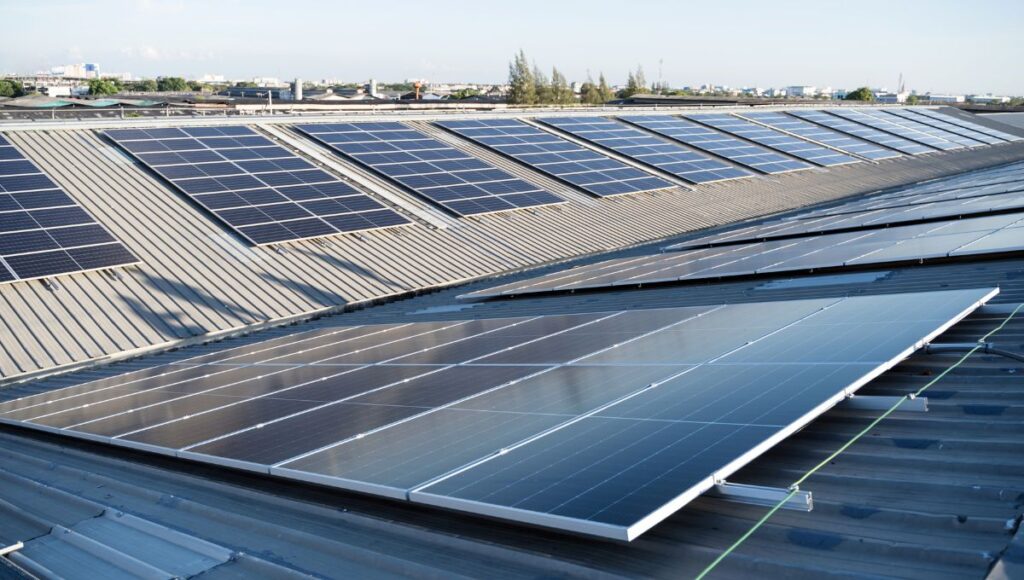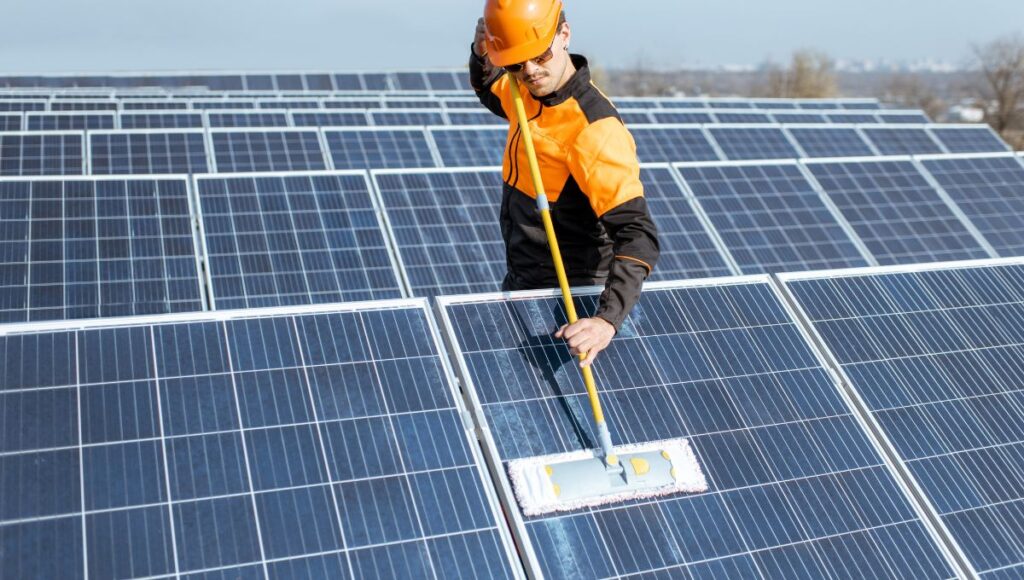How to store power from solar panels? What are the best methods to ensure you can use solar power even when the sun isn’t shining? These are common questions for those adopting sustainable energy solutions, and the good news is that there are clear answers.
Solar batteries are the best way to store energy from solar panels. They save excess energy produced during the day for use at night or on cloudy days. Lithium-ion batteries are a popular choice for their durability and high capacity.
Investing in a reliable solar energy storage system keeps your home or business powered during outages or low sunlight. It maximizes renewable energy use, reduces reliance on power grids, and lowers long-term costs.
Why is energy storage crucial for solar panel users?
Energy storage is essential for solar panel users, ensuring power is available even without sunlight. It stores excess energy generated during the day for use at night or on cloudy days, improving reliability and reducing reliance on traditional power grids.
1. Reliable Power Anytime
Solar batteries store surplus energy, providing electricity when solar panels don’t produce enough. This ensures homes and businesses remain powered during nighttime, cloudy periods, or grid outages, offering peace of mind and energy security.
2. Maximize Renewable Energy Usage
With energy storage, users can efficiently use almost all of the energy their solar panels generate. Instead of wasting excess power during peak sunlight hours, it’s stored for later use, making renewable energy solutions more sustainable and efficient.
3. Save on Energy Bills
Storing solar energy helps reduce reliance on expensive electricity from the grid. Using stored power during peak demand times allows users to avoid higher rates, ultimately lowering their monthly expenses and increasing long-term savings.
How do solar batteries enhance energy independence at home?

Solar batteries empower homeowners to rely on their own energy production, reducing dependence on traditional power grids. By storing solar energy for later use, they ensure energy availability during outages, lower costs, and support sustainable living.
1. Ensuring Power During Outages
- Store energy to supply power during unexpected outages.
- Prevent disruptions to daily routines with stored energy.
- Provides backup electricity for critical home appliances reliably.
- Enhance security systems that require continuous power supply.
- Keeps you worry-free during unpredictable weather disruptions.
2. Lowering Dependence on the Power Grid
- Reduced need for electricity from conventional grid systems.
- Access solar power even during times without sunlight.
- Unused surplus energy minimizes wasting renewable solar resources.
- Energy independence reduces exposure to grid energy pricing.
- Incentivizes home energy management with stored renewable power.
3. Promoting Sustainable Living
- Solar batteries store clean energy for future household use.
- Encourages broader reliance on eco-friendly energy solutions daily.
- Reduces carbon footprints with a renewable power consumption approach.
- Helps avoid reliance on fossil fuels for energy demands.
- Supports environmental conservation with efficient energy optimization.
What makes lithium-ion batteries the top storage choice?
Lithium-ion batteries are the top choice for solar energy storage due to their efficiency, durability, and compact design. They are reliable for managing renewable energy, making them a great investment for households seeking sustainability and energy independence.
1. High Efficiency and Performance
Lithium-ion batteries excel in energy retention, with minimal power loss during energy storage and retrieval. Their fast-charging capability ensures quick energy availability, enabling seamless integration with solar energy systems for efficient household energy management.
2. Long Lifespan and Durability
These batteries offer an impressive lifespan, often enduring thousands of charge cycles before needing replacement. Their robust design ensures long-term reliability, even under heavy usage, making them a cost-effective choice for renewable energy storage.
3. Compact and Lightweight Design
Lithium-ion batteries are known for their compact and lightweight build, making them easy to install in limited spaces. Their portability and sleek design suit modern homes while maintaining high energy storage capacity without taking up significant room.
Can solar energy storage reduce electricity costs effectively?

Solar energy storage can cut electricity costs by storing excess power for use during peak hours or at night. This maximizes renewable energy use, reduces grid reliance, and lowers electricity bills for solar-powered households.
1. Reduced Grid Dependency
- Less reliance on conventional electricity grid systems.
- Power is available during outages or peak loads.
- Encourages sustainable self-sufficiency with renewable resources.
- Helps avoid increasing energy costs over time.
- Supports decentralized energy solutions for modern households.
2. Maximized Solar Utilization
- Stores surplus generated energy for future use.
- Reduces wastage of unused daytime solar power.
- Provides renewable electricity even during night hours.
- Aligns energy use with household demand cycles.
- Supports consistent energy availability and reliability.
3. Lower Monthly Electricity Bills
- Cuts down additional charges from local energy providers.
- Avoids peak-time electricity pricing fluctuations.
- Reduces energy costs through optimized solar usage.
- Enhances savings with long-term sustainable energy storage.
- Shrinks utility bills while maintaining energy efficiency.
How to prepare for outages with solar energy storage?
Preparing for outages with solar energy storage ensures reliable power and energy independence. By combining solar panels with battery systems, households can store extra energy for emergencies. With the right setup, you can stay powered even during grid outages.
1. Install a Reliable Battery Storage System
Choose high-capacity solar batteries that suit your energy needs. These batteries will store excess solar energy during the day for use during outages, guaranteeing a dependable backup. A professional installer can help you select the right system for seamless integration.
2. Monitor and Optimize Energy Use
Track your energy consumption patterns to maximize storage efficiency. Avoid overloading your battery by managing power use during outages. Smart energy management systems can help distribute stored energy effectively throughout your home.
3. Regular Maintenance and Testing
Keep your solar panels and batteries in top shape through routine maintenance. Schedule periodic testing of the storage system to ensure its fully functional and ready for emergencies. Clean panels and check connections to maintain optimal performance over time.
Are solar batteries the key to sustainable living now?
Solar batteries are key to sustainable energy. They store renewable energy, reduce fossil fuel use, and support a cleaner environment. By providing power during outages, they make sustainable energy practical and accessible.
1. Benefits of Solar Batteries
- Reduce carbon footprint, promoting environmental sustainability.
- Store renewable energy for use during cloudy days.
- Lower electricity bills through energy self-sufficiency.
- Provide reliable backup during unexpected power outages.
- Enhance grid independence, ensuring more energy control.
2. How Solar Batteries Improve Energy Efficiency
- Optimize energy use by storing excess power.
- Minimize energy waste during peak solar production times.
- Enable cost-effective energy management for daily needs.
- Smoothed energy transitions during fluctuating demands.
- Boost renewable resource utilization across various applications.
3. Considerations When Choosing Solar Batteries
- Select batteries with adequate capacity for your needs.
- Research compatibility with existing solar power systems.
- Consider lifespan and maintenance requirements for durability.
- Evaluate installation costs and available financial incentives.
- opt for trusted brands with proven performance records.
Conclusion: How to store power from solar panels?
Investing in solar batteries is a smart move toward a more sustainable and energy-efficient future. By choosing the right battery for your needs, you can enjoy lower energy costs, enhanced reliability, and greater independence from the grid. Remember to consider factors like capacity, compatibility, and durability when making your decision. With the right setup, you’ll not only maximize the benefits of your solar power system but also contribute to a greener planet.
FAQ
Q.NO.1 How long can solar energy be stored in a battery?
Solar energy can be stored in a battery for 1 to 5 days, depending on capacity and usage. It’s a great way to keep the lights on when the sun isn’t shining.
Q.NO.2 Types of solar energy storage systems?
The two main types of solar energy storage are lithium-ion and lead-acid batteries. Lithium-ion is more popular for its efficiency and longer lifespan.
Q.NO.3 How long can solar energy be stored?
Solar energy can be stored for hours or days, depending on your battery system. It’s like saving sunshine for later super handy.
Q.NO.4 How to store solar energy at home?
Store solar energy at home with a solar battery system, like lithium-ion batteries. Easily installed, they let you use solar power anytime—even at night.
Q.NO.5 What is the most efficient method of storing solar energy?
The most efficient way to store solar energy is with lithium-ion batteries. They’re reliable, long-lasting, and highly efficient.

